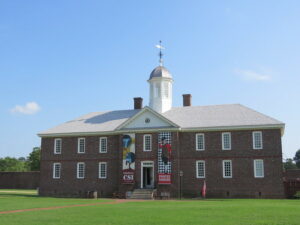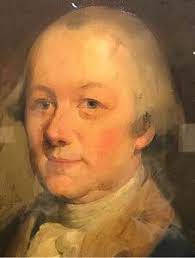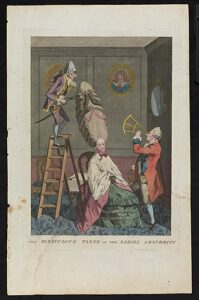Americanism Redux
October 12, your today, on the journey to the American Founding, 250 years ago, in 1773
The darkness. Oh, the darkness. Into the darkness I see.
* * * * * * *
The wolves stay quiet and deep in the forest. Ashes in the campfire are still warm. The gray light of an autumn dawn covers the land and the headwaters of Wallen Creek.
Eight people are asleep.
Twenty other people watch them, just out of view.
It is near Big Moccasin Gap, Clinch Mountain.
Seconds later, shrieks fire the air. Seconds after that, screams join the shrieks.
The twenty people are attacking the eight people. Violence, suffering. Vengeance, sacrifice. It is chaos and hell is above ground. The wolves stay in the woods.
Among the eight people is Jim Boone, son of Daniel and Rebecca, part of a group of Virginians seeking a new life on the far side of the mountains, in Kentucke. He is 17 years old and bleeding from a gunshot wound. He knows his attacker, Big Jim, a member of the native Shawnee tribe and one of the twenty people who watched from the woods a few minutes ago. Big Jim is a regular visitor and presumed friend of the Boone family and home back in the Yadkin River valley.
Jim Boone begs to Big Jim. He pleads for the native man to kill him quickly—”shoot me, Big Jim, shoot me”—so that he won’t suffer further in the darkness that burns. Big Jim refuses. He chooses to continue killing the bleeding Boone slowly, with a knife and a tomahawk. A cut, a slice, a pull and twist. Piece by piece. He won’t stop until something inside of him sends the signal.
Boone cries out as the signal waits. “Please.”
That was two days ago and now father Daniel and mother Rebecca gather their lives from the cold ashes and return to the quest for their new world of Kentucke.
In the woods of Kentucke, beneath the moon called Hunter’s by the Shawnee, the wolves howl, the coyotes bark, and the panthers scream. And Daniel Boone begins the hunt of Big Jim.
(the site where the begging occurred)
* * * * * * *
Today, 250 years ago, a new facility opens in Williamsburg to help with the darkness. It is the culmination of a seven-year endeavor in the British colony of Virginia. The “Publick Hospital for Persons of Insane and Disordered Minds” opens today. Conceived in 1766 by then-British Governor Francis Fauquier, funded in 1770 by the colony’s legislature, and now taking its first patients today in 1773, the Publick Hospital is the first of its kind in Britain’s thirteen American colonies. Zacariah Mallory and Catherine Harvey are brought to the facility today for evaluation.
(the Publick Hospital, Williamsburg)
* * * * * * *
Darkness is heading our way, writes Alexander McDougall in New York City. McDougall has completed his second essay that is published and available today in the city. He’s writing under a false name—Hampden—and entitles his essay “The Alarm”, an apt label in his view. He warns the people of New York City about the evils of the British East India Company (EIC). He describes in stirring tones the brutality and savagery visited upon the native people of India by the EIC. He also compares it to the worst atrocities committed against natives in America by the Spanish explorer Cortes. Hampden, or McDougall, asserts that EIC’s monopoly power is at the root of its conduct. The reader is left with no doubt as to the implications—if unchecked, the EIC and its tea monopoly will inflict the same horrors on the colonists.
(Alexander McDougall, a key colonial rights leader in fall 1773)
* * * * * * *
Darkness seems to envelop the house of the Warrens in Plymouth, British colony of Massachusetts. Mercy Otis Warren She is discouraged by what she sees and hears from the people around her. She knows about the British tea and the EIC as well as the hostilities running rampant in Massachusetts politics and government right now. All of it is crushing down on her. Today she completes her latest poem, which includes the following dark part:
“Is there no permanent, no steady pole,
To point us on, and Guide the Wandring Soul,
Does prejudice, and passion, Rule Mankind.
Are there no springs that actuate the Mind,
Whose deep Meanders, have some Nobler source,
Than Vain self Love; to Guide their Winding Course.”
In Mercy’s town of Plymouth, no one could say with certainty which rock it was that the Pilgrims landed on.
(Mercy Otis Warren, despondent this week)
Also
Judging from their work, the Darlys seem to live above the darkness, soaring over life while scanning the landscape for scenes that strike their eye.
Mary and Matthew Darly are a husband-and-wife team living in London, England. They’re a unique pair. They make and sell a wide array of art in astonishing forms—cartoons, sketches, paintings, and decorative panels for ceilings, wall, chimneys, and furniture. They’re nonstop with ideas and creativity, and operate with a keen sense of opportunity and market need. They accept applications for art students also, giving lessons to clients who pay handsomely for their sessions. Today, 250 years ago, the Darlys publish a cartoon by Richard Mansergh St. George, entitled “Matthew Manna, A Country Apothecary.” The image both captures the spirit of the job and adds a dash of sarcasm in the written description: “Gentlemen shaved & Hogs Gelded. Shave for a penny & Bleed for 2 pence.”
The Darlys stay in tight harmony with the world around them. They look at life and see art. For them, darkness is line and shadow, used for depth on the drawn page.
(A Darly creation)
For You Now
A thing that is all around us was also a thing for those who lived 250 years ago.
We have so many concerns about mental health and here we see, in today’s Redux, the very first attempt to address mental health on a free-standing, institutional basis with the Publick Hospital. The issue was of enough importance that a political leader tried to act, a political body finally listened to the call for action, and a colonial capital-community rallied to build a new facility for new methods and techniques to one of life’s most mysterious conditions. It all began with one and we’re still growing the count.
We’ve seen another new-old way this week, too. Since the Redux of a week ago, a new war is loose in the Holy Land. Like war in Ukraine, it’s a scene of darkness coming down across many people. And yet we see an ancient side of ourselves, one that goes back to Kentucke where mercy was sought and mercy was rejected, and still farther back to the eons and eras of origins and origin stories, each flowing in the valleys of rivers.
The worries of Mercy Warren are familiar to us again. To where, to whom, to what, to when will we look to gain our bearings for the right course ahead? We read her and hear ourselves.
I think about the place where she writes and how it informs us. Maybe it’s not important to know exactly which rock it was where a first foot stepped. Maybe the most important thing is to know that the foot stepped on the rock at all, and why it happened, along with the story that goes from there. That’s knowable, and that’s a standard against which something can be measured, and weighed, and secured. And also understood.
We need bright eyes with quick vision so we can adjust the angle of flight. To see through the darkness, like the owl, and to know that the screams from deep in the forest are not the only signs of life there. To be alive to more than as contrast to death but to sense life itself and move to become more living than life-like, per the Darlys.
(sees all)
Suggestion
Take a moment to consider this: is there a memory to which you can return to gain steadiness?
(Your River)














